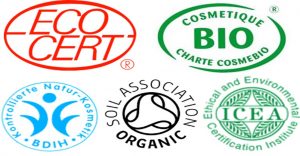
Organic cosmetics are created from ingredients which have been certified organic by one of the numerous certifying institutions that operate worldwide. An organic ingredient is formally an ingredient which has been farmed, treated, harvested and stored without the use of synthetic chemical compounds. Organic cosmetics are produced from the best natural component of plants and flowers that do not result in skin irritation at all as compared to the chemical-based cosmetics.
Are organic cosmetics better for your skin and health?
What goes on your skin eventually goes in your body. If you slather chemical-filled soaps, lotions and creams over your skin, your body absorbs those toxins. That means common artificial chemicals in conventional beauty products, like phthalates, parabens, petroleum waxes and others, go straight into your body. Many of the chemicals in beauty products have never been tested, so any potential health problems they can cause are virtually unknown.
Certified organic beauty products will only include organic ingredients that meet the same growing standards as organic food. That means no ingredients grown with chemical pesticides and fertilizers.
Standards and certification
The best way to finding natural or organic cosmetics is to look for certification. There are many different certifiers in the marketplace – here are some of the main ones you’ll find in the world:
COSMOS – Standards
COSMOS is an international standard for organic and natural cosmetics. Founded in 2010 as a collaboration between five European organic certification bodies, BDHI (Germany), Cosmebio (France), Ecocert (France), ICEA (Italy) and Soil Association (UK), it’s now global.

As a relatively new standard, the logo isn’t widely seen at the moment – many companies still use the logo of the original certifier – but it’s likely to become more visible in coming years.
COSMOS Organic:
Contains a minimum of 95% certified organic ingredients of biological (plant or animal) origin. Water, salts and minerals can’t be counted as organic, so this calculation is based on the other ingredients, which are mostly plant-based ingredients and animal products.
However, at least 20% of the total product (which includes the water and so on) must be organic, except for mineral makeup products and wash-off products (and others which reasonably have a very high water content) for which the minimum percentage is 10%.
Further requirements are that there are no genetically modified or irradiated ingredients, no nanoparticles and no animal testing. Animal products can be used (such as beeswax or honey), but not parts of dead animals. The packaging also has to meet certain requirements.
COSMOS Natural:
The standard for natural ingredients stipulates which ingredients are permitted and how they may be processed. The product doesn’t have to be 100% natural – instead the percentage of “natural” ingredients is listed, and can include water, salts and minerals.
Australian Certified Organic
Australian Certified Organic is the first Asia-Pacific based certifier accredited under the COSMetics Organic and natural Standard (COSMOS) as an approved certifier for Organic and Natural cosmetics as well as cosmetics raw materials, following an accreditation process through the International Organic Accreditation Service (IOAS).
Australian Certified Organic has two certification categories for organic cosmetics:
Certified organic: Contains a minimum of 95% certified organic ingredients (excluding salt and water) and up to 5% consisting of other approved ingredients.
Made with certified organic ingredients: Contains 70–95% certified organic ingredients (excluding salt and water) with the remainder from approved non-organic sources.
Australian Certified Organic also certifies products on behalf of COSMOS, so you may see both logos on some products.

Natrue
Natrue is an international certifier for natural and organic cosmetics and skin care products, with locally based certifiers in various countries. Only water, natural ingredients, derived natural ingredients and nature-identical ingredients are permitted. There are three levels of certification: natural; natural with organic ingredients (70% or more organic ingredients); and organic (95% or more organic ingredients).

NSF
The NSF “contains organic ingredients” standard is a US national standard for personal care products making organic ingredient claims. Products must undergo a thorough review by an independent organic certification organisation to verify the product contains least 70% organic content by weight.

Others
While the above are the main certifiers for the products we came across, other organic certifiers for ingredients and/or the total product include Soil Association (UK), BioGro (NZ), Ecocert (France), OFC, BDIH (Germany), Cosmebio (France), ICEA (Italy), Natural Products Association (US) and USDA Organic (US). You may see one or more of these logos on marketing material and packaging – a company may apply to different organisations for certification according to the markets in which they sell.
Organic cosmetics do not contain synthetic fragrances
You won’t find “fragrance” listed on organic beauty products labels—as long as the product is USDA-certified organic. Instead, each ingredient that makes up the fragrance will be listed individually. Whether that ingredient is an extract or an essential oil, you’ll know exactly what components are creating that lovely scent.
A fragrance may make up of hundreds of different chemicals. The FDA doesn’t require companies to disclose the ingredients in their fragrances, even though many common ingredients in fragrances include chemicals may be linked to cancer and other health concerns.
As far as your skin goes, these unspecified “fragrances” can cause irritation and even trigger allergic reactions. Plus, unknown chemicals can mess with your skin’s natural pH levels.
Are organic cosmetics work better?
Certified-organic beauty products work better simply because they are made with superior ingredients. It’s like cooking. A great dish probably doesn’t include artificial flavours or fake, processed foods. Instead, it’s likely made of pure, fresh and simple ingredients. Beauty products work the same way. Better ingredients mean better results. Those with sensitive skin can especially benefit from organic beauty products that contain high-quality ingredients that won’t aggravate or worsen skin.
Organic cosmetics won’t harm the environment
This one isn’t specifically for your skin, it’s often easy to forget about the environmental impact of beauty products. When you use organic beauty products, you can help minimize your environmental impact. First, you won’t have to worry about chemicals going down the drain because there won’t be any in the bottle. You can also look for organic beauty brands that obtain their ingredients from Fair Trade sources or from local farms and suppliers. And, be sure to check out companies that package their products in glass or biodegradable packaging.
